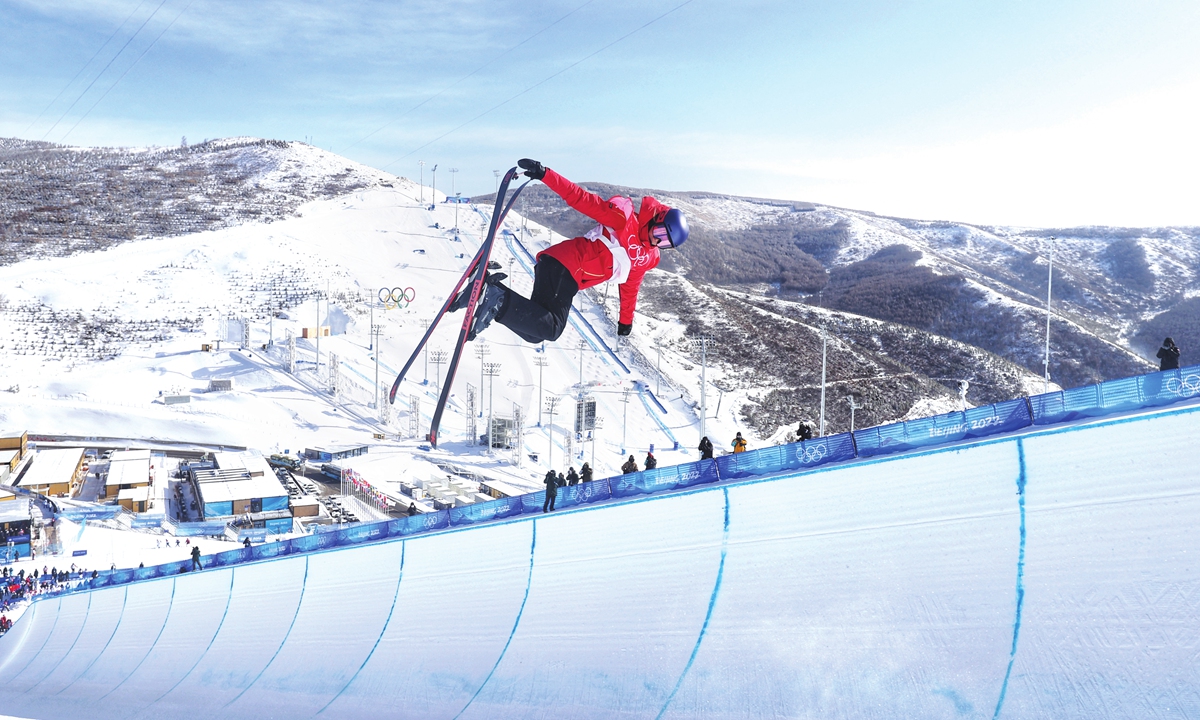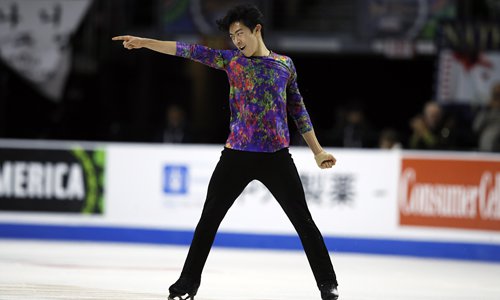The Media Center of the Beijing 2022 Winter Olympic Games Photo: VCG
The Media Center of the Beijing 2022 Winter Olympic Games Photo: VCG
The Beijing Winter Olympics successfully closed on Sunday. The sports event, "truly exceptional" as International Olympic Committee President Thomas Bach described at Sunday's closing ceremony, showed the world not only the excellent performances of Olympians, but also how China overcame challenges to offer the participants high-quality facilities and services amid the global COVID-19 pandemic.
`
Nonetheless, observers said it's sad that many foreign audiences, who usually receive information from some biased Western media outlets, the US media in particular, hardly knew about the Beijing Winter Games in an authentic and objective way.
`
How did some influential American media outlets cover the Beijing Winter Olympics, when the US sees China as a strategic rival? The Global Times selected six US media outlets that represent different interest groups in the country, and collected and analyzed their recent coverage related to the Beijing Winter Games, trying to learn about the US media's strategy concerning the Games and the possible prejudice behind it.
`
The selected six media outlets were CNN, The New York Times (NYT), Wall Street Journal (WSJ), Fox News, National Public Radio (NPR), and USA Today.
`
`
Media's 'China agenda' of Beijing Olympics `
By using online media monitoring tools, the Global Times reporters collected media coverage related to the Beijing Winter Games in February, particularly the week of February 14-21, focusing on coverage from CNN, NYT, WSJ, Fox News, NPR, and USA Today.
`
These six major media outlets presented a very mixed tone in their discourse of the closing ceremony of the Winter Games on Monday night.
`
In the titles of articles published by these US media outlets, most of the pieces included negative adjectives such as "rocky", "strange", "unwelcomed", "controversial", and "overshadowed by a doping scandal" in describing the Games, the Global Times reporters found. There were a lot references to alleged "human rights violations" and "excessively strict quarantine policies" in their review, though some articles provided a relatively objective picture of the well-designed and touching details of the closing ceremony.
`
The sour grapes mentality exhibited by US media is on full display in these articles. NPR, for instance, even preposterously tagged the Games as "the most controversial, most unwelcoming Olympics of our lifetime" in an opinion piece by its staff.
`
https://money.yahoo.com/most-controversial-most-unwelcoming-olympics-150319010.html
`
US politics and media observers tend to classify CNN and NYT as the liberal media (or "left-wing"), WSJ and Fox as conservative media (or "right-wing"), while NPR and USA Today as relatively moderate media (or "center"). American media outlets with different editorial objectives speak for different groups in the US, while they usually stand together against other countries for US national interests.
`
Looking back the past week, CNN, a typical "left-wing" media outlet known for its mostly liberal views, published some 73 articles covering the Beijing Winter Games from February 14 to 21. Fourteen of the articles were related to China or Chinese athletes, found he Global Times.
`
Among the 14 articles, four were positive overall, covering the performances of Chinese gold medalists such as figure skaters Sui Wenjing and Han Cong.
`
Three of the 14 articles were written in negative tones, which made far-fetched links between the sporting event and China's relationship with other countries. In a February 19 article reporting on a "doping scandal" about Russian skater Kamila Valieva, CNN frequently mentioned Ukraine's "border tension" and the "close ties" between China and Russia.
`
The NYT is another mainstream media publication popular among US liberalists. The Global Times found that between February 14 and 21, it produced about 211 pieces covering the Beijing Winter Games, 30 pieces of which are related to China and Chinese athletes.
`
The NYT reported on the Games with much broader views than CNN did. Among the 30 pieces, 12 were positive overall and covered not only Chinese gold medalists, but also the various cuisines provided at the Olympic Village, and China's speed trains near the Village.
`
However, in its six pieces written in a negative tone, the NYT seemed to make bigger efforts in smearing China with strange, baseless accusations. In a February 19 article reporting on a "doping scandal" about Russian skater Kamila Valieva, CNN frequently mentioned Ukraine's "border tension" and the "close ties" between China and Russia, trying to hint at China being behind the Ukrainian crisis. That was neither true nor related to the Beijing Winter Olympics in the slightest, noted Chinese international relations and media experts.
`
The WSJ, a center-right US-based media publication, published 28 reports on the Beijing Winter Olympics between February 14 and February 21, 13 pieces of which are related to China and Chinese athletes.
`
Only two of the reports were relatively positive, focusing on Gu and China's record-breaking gold medal haul.
`
Five had negative tones, involving claims of China's "data surveillance of athletes" and "dismal ratings for the Winter Olympics" that were patently untrue or have been repeatedly refuted.
`
FOX, a typical right-wing media outlet in the US, ran about 143 stories between February 14 and February 21, 31 of which were closely related to Chinese athletes or China.
`
FOX reported on international athletes' positive comments about the Winter Olympics, including praise for the quality of the ice rink in Beijing's Olympic Village, the efficient closed-loop quarantine measures, the popular Chinese food in the Village, high-tech elements, and stories of Chinese athletes' valiant efforts.
`

`
Gu Ailing of Team China competes in the women's freestyle skiing halfpipe event on February 18. Gu became one of the favorite topics of American media outlets about the Beijing 2022 Winter Olympic Games. Photo: Cui Meng/GT `
However, some of the articles forcefully conflated the Games with unrelated political issues such as the situation in the island of Taiwan and alleged "human rights concerns" in Xinjiang, despite repeated calls from mainstream international voices to avoid politicizing the Games.
`
In a piece titled "Beijing Olympics get political with Taiwan, Uyghur questions", FOX repeatedly peppered the piece with political issues, and hyped the question "if IOC uniforms and other IOC garments were produced by Uygur labor - or from Xinjiang cotton."
`
Being regarded as a centrist media outlet by many, NPR published some 72 articles on the Beijing Olympics between February 14 and 21, and 10 of the articles were related to the host country China, and Chinese athletes.
`
Of the 10 articles, only one was relatively positive, narrating the positive impact that Gu has had on more young girls participating in winter sports.
`
The rest of the articles, while trying to maintain a relatively objective stance, included two direct attacks on China for "politicizing the Olympics" and "deplorable" restrictions imposed by the country's quarantine policies.
`
USA TODAY, another US media among centrists, ran 105 stories about the Beijing Olympics from February 14 to 21, of which 10 were directly related to Chinese athletes or the organizers.
`
Three of the articles were the relatively neutral coverage of the performance of Chinese athletes on the field. One article on February 18, however, was written in a biased and negative tone, intentionally quoting an individual athlete as saying the Beijing Olympics "terrible,", the Global Times found.
`
Correspondents and their predetermined perspectives `
Many influential US media outlets sent correspondents to cover the Beijing 2022 Winter Olympics. At least 10 corresponds appear to be Chinese Americans or come from an Asian background.
`
Looking into their stories, however, most of the correspondents acted not as bridges linking Chinese and American audience, but as barriers that deepened misunderstandings between the two.
`
Amy Qin of the NYT, for instance, is a name familiar to many Chinese readers. This Asia-based correspondent regularly covers Chinese politics and society, and many of her stories have, in the past, sparked controversy laced with bias and misinformation, such a COVID-19 origins tracing piece that was published in June 2021.
`
Qin wrote at least 12 stories during the Beijing Olympics, reporting from the opening ceremony and Chinese athletes, to China's dynamic zero-COVID policy and winter sports popularity, as shown by the NYT website. In a February 19 article covering the skiing development in Northwest China's Xinjiang Uygur Autonomous Region, she blatantly mentioned the "genocide" rumor at the end, eclipsing any bright spots regarding skiing development in the region that may have been mentioned in her article.
`
With a cross-cultural background herself, Qin seems particularly interested in American-born athletes of Chinese descents, and what the current China-US "rivalry" has done to the group. On February 16, she wrote that Nathan Chen, a Chinese American figure skater who won gold at the Olympics, was "ignored" by the Chinese public in a seeming attempt to criticize the so-called "resurgent nationalism" among "[Chinese] citizens."
`
US correspondents in China have been a window for Americans to know more about the country. Unfortunately, "most [US correspondents in China] are actually tools to play up the negative image of China that caters to the American elites," Li Haidong, a professor from the Institute of International Relations of the China Foreign Affairs University, told the Global Times.
`
Nonetheless, in the era of the great boom of social media, these correspondents and the US mainstream media, can no longer dominate China-related discourse, as social media have increasingly become a popular way for people to follow Olympic-related topics, which indeed poses a challenge to the monopoly of traditional mainstream media in depicting China, Li said.
`
Despite the widespread "political boycott" against the Games played up by the US mainstream media, Americans are not fooled and many still genuinely enjoyed watching the Games across numerous social media platforms and shared what they are fond of or the Games' most captivating moments. That's a reality, but also a story that never gets told, Vipinder Jaswal, founder of the US-based PR company Vippi Media, told the Global Times in a previous interview.
`
Jaswal said that the mainstream media and politicians coming against the Games have the greatest function to negatively influence people and disseminate some type of propaganda, but people were largely not fooled.
`
N
arration full of bias and lies `
The collected data showed that in general, positive coverage of US media mostly focused on relatively light topics in specific sports or social areas, including Chinese athletes winning medals, and international athletes enjoying delicious meals at the Olympic Village.
`
Many of its negative coverage, ridiculously, had little to do with the Games. These articles were usually related to politics and economy, and clichés that alluded to "problems" in China that actually don't exist, such the "Xinjiang forced labor" accusation. Regardless of the fact that much of the fake news has been clarified by Chinese government, US media rehashed them, lashing them to the Winter Olympics for eye-grabbing sensationalism.
`
Discourse on the Games in the mainstream US media, whether liberal or conservative, has yet to get rid of the "gloom filter" that was projected in their typical coverage full of prejudice against China's development, observers said Although American media outlets with different editorial objectives speak for different groups in the US, they usually stand together against China for US national interests, they noted
`
They are still trying to use the US political elitist narrative of human rights standards as a weapon to attack the Games, Li told the Global Times.This ideology-oriented reporting approach inevitably leads to bias in the US media's reporting on China, and it ends up further away from the "independence" and "transparency" advocated by Western news ethics, said Li.
















